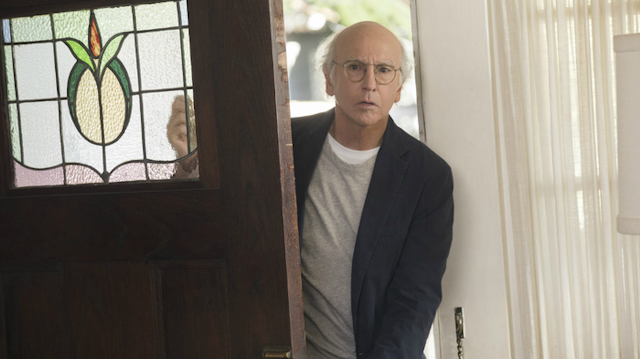When Larry David joked about chatting up women in Nazi concentration camps recently he caused a minor storm of outrage. As part of a monologue on Saturday Night Live, David mused:
I’ve always been obsessed with women – and I’ve always wondered: If I’d grown up in Poland when Hitler came to power and was sent to a concentration camp, would I still be checking out women in the camp? I think I would.
“Of course,” he continued, “the problem is there are no good opening lines in a concentration camp. ‘How’s it going? They treating you OK? You know, if we ever get out of here, I’d love to take you out for some latkes. You like latkes?’”
David has joked about the Holocaust before. In the comedy show he co-created, Seinfeld, an entire episode is devoted to Schindler’s List. In his own show, Curb Your Enthusiasm, he plays Wagner (a favourite composer of Adolf Hitler) to a co-religionist who accuses him of being a self-hater. He invites a cast member of the reality show Survivor to meet a Holocaust survivor and they proceed to argue over who had it worse off. Many suggested David’s jokes weren’t in good taste, that he had crossed a line this time. But had he?
David is building upon a tradition of Holocaust humour which is nothing new. In the early 1960s, following the kidnap, trial, and execution of Adolf Eichmann, legendary Jewish comic, Lenny Bruce, had a joke in which he’d say in a redneck used car salesman’s voice: “Here’s a Volkswagen pickup truck that was just used slightly during the war carrying the people back and forth to the furnaces.” Or he held up a newspaper with the headline: “Six Million Jews Found Alive in Argentina.”

In 1964, Stanley Kubrick’s movie Dr Strangelove or: How I Learned to Stop Worrying and Love the Bomb parodied contemporary fears of nuclear destruction by conflating it with the Holocaust through its title character, a pantomime Nazi played by Peter Sellers. Three years later, in 1967, Mad Magazine’s Mein Kamp Humor Dept, produced the parody Hokum’s Heroes. “And here it is … the brand new weekly TV situation comedy featuring that gay, wild, zany, irrepressible bunch of World War II concentration camp prisoners … those happy inmates of ‘Buchenwald’ known as … ‘Hochman’s Heroes’.”

Then, in that same year, Mel Brooks directed The Producers a film which featured a bad taste musical named Springtime for Hitler, complete with Busby Berkeley-style routines of SS troops dancing in swastika formation.
Knowledge beats outrage
Such Holocaust humour has grown exponentially in recent decades. This is particularly evident in mainstream American cinema where the Holocaust often appears as an incidental, gratuitous, superfluous throwaway line, or in-joke. Take Woody Allen – who has had a career-long fascination with the Holocaust. When asked in Deconstructing Harry (1997): “Do you care even about the Holocaust or do you think it never happened?” Allen has his protagonist Harry Block respond: “Not only do I know that we lost six million, but the scary thing is records are made to be broken.”
As Holocaust scholar Lawrence Baron has pointed out in his book, Projecting the Holocaust into the present, images and themes from the Holocaust permeate popular culture like particles of dust filling the air. The Holocaust has become the benchmark and paradigm for evil. It is invoked – and, the more the term is used, the less powerful it becomes. This saturation has its consequences: it becomes ripe for humour. It is no longer taboo.
But it is also generational. For those born towards the end or soon after World War II, the Holocaust was a narrative they heard secondhand. For those born later, it is an historical event. They don’t know anyone who was murdered by the Nazis.
At the same time, Holocaust education has worked. In mainstream politics, it’s considered unacceptable to publicly deny the Holocaust – and is illegal to do so in many countries. For their part, younger Jews have learned that a low profile is useless, given that anti-Semites aren’t so discerning in their discrimination. At the same time, anti-Jewish prejudice has been on the decline in many countries – particularly towards the end of the 20th century and beginning of the 21st.
A generation of Jewish producers, directors, actors, actresses and screenwriters emerged that was less anxious, less afraid of stoking an antisemitic backlash. This is evidenced by the lack of outrage to so many of these jokes over the years, many of which have passed by barely noticed.
Larry David’s shtick on SNL is merely the latest in a 60-year trend. He is locating himself in a venerable tradition of gallows humour at which Jews have historically excelled. We have joked about pogroms before so why not the worst of them all? It does not mean that we are forgetting the Holocaust – on the contrary, the jokes are a form of remembrance. Having said that, I think that younger Jews are more likely to laugh than older Jewish people or non-Jews – we are more familiar with this humour and hence it’s less shocking.
But the key thing is: who is doing the telling? All the examples noted above are by Jews and that’s the principal point – if someone non-Jewish were to engage in this type of humour, it would have an entirely different connotation. It would not be appropriate.

